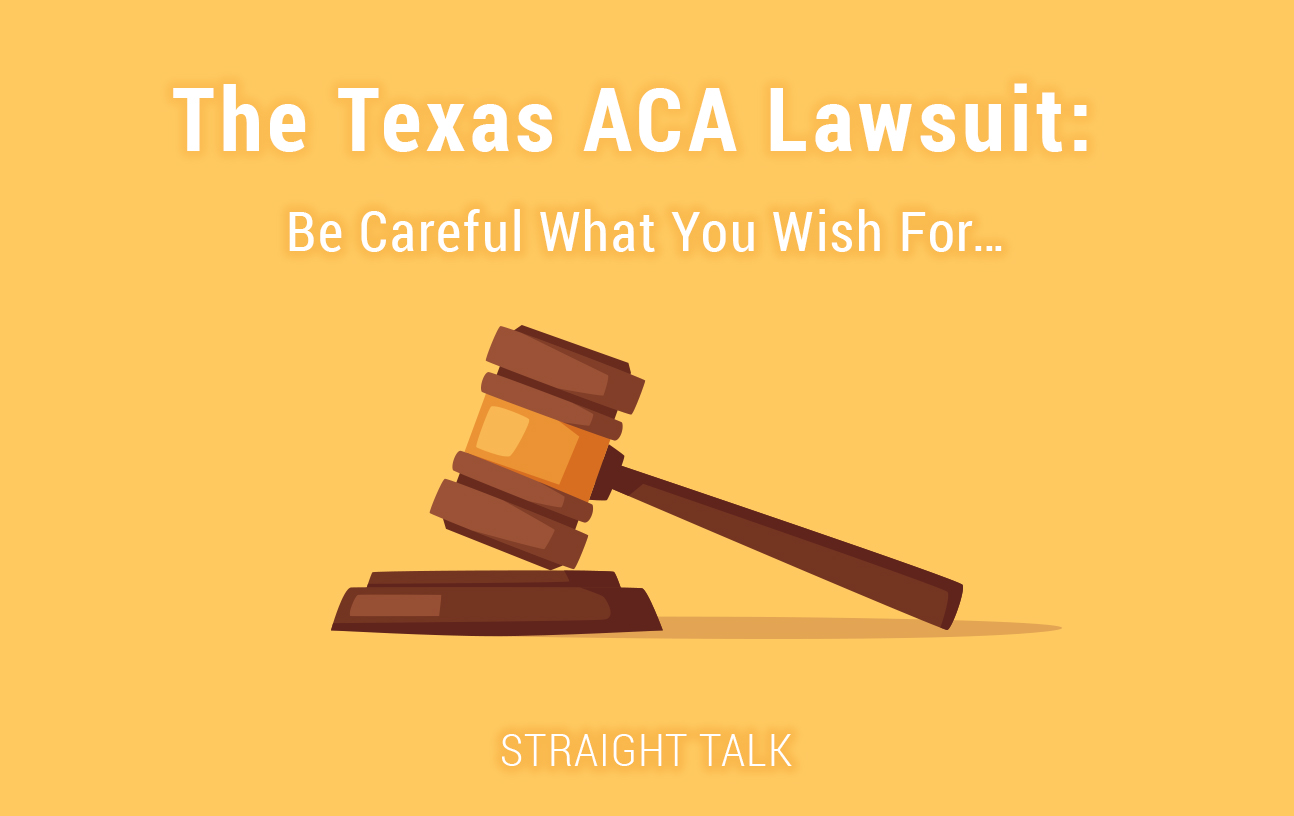I’ve written a three-part series (part 1, part 2, part 3) explaining the origins of the Affordable Care Act (ACA) and issues that have arisen, leading up to the currently pending lawsuit to do away with the ACA.
Which brings us to today, and the Texas v U.S. case that prompted the Dec. 14, 2018, ruling that the ACA is unconstitutional. How have the cracks in the law’s foundation spread to this?
First, the underlying core of the ACA is a really crazy notion: Health insurance (not healthcare) is so important to our national security that Congress is within its purview to demand that everybody buy some. In other words, the federal government CAN punish you for failing to buy this with a fine in real dollars.
That’s what the final version of the ACA/HCERA said when it was passed and signed on March 23, 2010. Starting on Jan. 1, 2014, basically everyone who couldn’t claim one of the three sparse exemptions (which had hit almost 30 by 2018) would have to pony up $695 or 2.5 percent of their annual incomes, whichever was BIGGER.
Wow! Can you think of anything else the federal government will punish you for NOT buying? Go ahead, I’ll wait…
The First Big Challenge
When the ACA, rough draft that it was, passed in 2010 and demanded that everybody buy insurance or sign up for Medicaid or Medicare or SOMETHING, it was a completely new concept at the federal level. It’s no small wonder there were a slew of lawsuits proclaiming that such a measure was completely unconstitutional. After a couple of years of litigation, these cases were all smashed into a single action called the National Federation of Independent Businesses (NFIB) v. Sebelius (Kathleen Sebelius was the secretary of the federal health department when this all came down, so she was a proxy for the U.S. government in this case).
So, in Spring 2012, the U.S. Supreme Court heard the arguments both for and against the notion that the federal government had the authority under the constitution to charge you money for not buying health insurance.
Arguing for the U.S. government and defending the ACA was Solicitor General Donald Verrilli, a long-time Democratic operative. The government offered three scenarios where it believed it had the authority to take your money for not buying health insurance:
- The Commerce Clause: Since health insurance falls under interstate commerce, the Feds could require you to buy it. Justices’ response: NOT A CHANCE.
- The Necessary and Proper Clause: Since there were almost 50 million people who were uninsured, this constituted a national emergency, and the President and Congress had the emergency power to do what was necessary and proper to fix the problem, including adding a fine to the lack of ownership of health insurance. Justices’ response: NOPE!
- The Taxing Power of the Federal Government: Since the taxing authority of Congress is essentially unlimited, the Individual Mandate penalty of the ACA was really a tax, and Congress was within its rights to collect the money. Justices’ response: That’s complicated, but 5-4 we’ll let you slide on that one.
What really made #3 so sticky was the fact that both Congressional leaders AND the president had made it VERY clear publicly on many occasions prior to 2012 that the individual mandate was NOT a tax at all.
Ultimately, they had to make that argument because under our constitution, all tax bills MUST originate in the House of Representatives, but the ACA clearly began its life in the Senate. Despite these missteps, Chief Justice John Roberts decided to let the whole “it’s a tax for these purposes only” argument ride, and the ACA was saved!
During these arguments, some very pertinent points were made, mostly by the justices who voted AGAINST the individual mandate being constitutional, but also by Solicitor General Verrilli and others who argued in FAVOR of the ACA.
Key among these arguments, and connected to the justices’ final decision, was the notion that the ENTIRE LAW would fall without the individual mandate. It was stated over and over again by ACA defenders that the law could not survive without the mandate and indeed, it was NOT SEVERABLE from the rest of the law!
All the arguments that fed the decision made in Texas had their origins in the 2012 Supreme Court decision. This was another huge crack in the ACA’s foundation.
On Friday, Dec.14, 2018, a judge in Texas said the individual mandate, now that it has been reduced to $0 fine (and therefore no longer fits the federal definition of a tax, which is to “raise revenue”), is essential to the existence of the ACA (oddly enough, agreeing with all the PRO-ACA arguments at the Supreme Court from 2012), and is therefore not severable from the rest of the law.
Thus, the only valid interpretation of the individual mandate as law is the one the Supreme Court used to SAVE the law back in 2012 (as an expression of Congress’ taxing authority). Since the mandate no longer fit the definition of a tax AND the ACA could not stand without the mandate AND it was not severable, the entire ACA is now unconstitutional.
What Happens Now?
At the moment, there are no immediate changes coming from this ruling. The Texas ruling is being appealed, and pending a final outcome, any insurance coverage you bought/enrolled in for 2019 will continue as planned.
Blue Cross and other health insurers are assessing the ruling to understand the implications and when any operational changes would need to be made. We have our customers’ best interests in mind, and we’ll let you know as soon as we anticipate changes coming.
Personally, I think it highly unlikely that the ACA will be disrupted in any way anytime soon. Eventually, the losers at the District Court (Texas) will appeal to the 5th Circuit Court of Appeals, and if they lose there, the U.S. Supreme Court would be their next stop. All of this will take several years to resolve, and at the end of the day, we’ll get to see if any judge or panel of judges would declare something unconstitutional if it means millions of people losing their health insurance.
Unfortunately, the continual change we’ve been operating under with regard to the ACA for the past several years doesn’t appear to be going away. But, I’ll be here to give it to you Straight on the latest issues and challenges.
Stay Tuned!





Leave a Reply